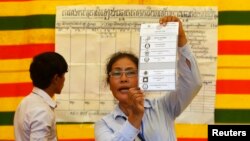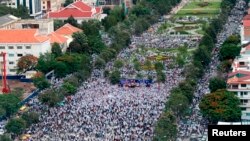WASHINGTON —
Cambodia’s ruling party has reportedly won in national elections Sunday, but it appears to have lost a significant number of seats in parliament.
According to preliminary election figures released by Information Minister Khieu Kanharith, the Cambodian People’s Party won 68 of 123 National Assembly seats.
That’s a loss of 22 seats from its sweeping victory in 2008, but it is still a majority, giving the CPP a continued hold on power. The CPP lost ground to an energized opposition, the Cambodia National Rescue Party, which won 55 seats, according to the early figures.
The National Election Committee was still tabulating results in Cambodia late Sunday, but it seemed clear by the end of the day that the opposition had made major gains. No other party was reported to have won any seats. That includes the royalist Funcinpec, marking a huge decline for the party that originally won Cambodia’s first peacetime elections, in 1993.
The late return of opposition leader Sam Rainsy, who was granted a royal pardon but who was not permitted to contest the elections, invigorated his supporters, as tens of thousands of people joined rallies ahead of the polls, translating into major gains at the ballot box.
In a press conference late Sunday, Sam Rainsy called for calm following the elections.
“We want to thank all Cambodian people... regardless of their political affiliation, Cambodians who support all political parties, for their dignified participation in this election, for their contribution to make democracy move forward,” he said, according to Reuters.
The result seemed a surprise to some CPP officials, who had appeared very confident during Election Day they would maintain something close to their 2008 seats.
In Kampong Cham province, for example, where 18 seats were up for grabs, National Assembly President Heng Samrin, a top member of the CPP, said that his party would likely hold onto 11 seats. Opposition estimates at the end of the day, however, showed the CPP had likely won just six or seven seats there.
In exit polls, voters were reluctant to say which parties they had voted for, but they were not shy in saying why they voted the way they did.
“I hope the result is free and fair, so that people can choose the leader they like,” said Seng Dany, a voter in Siem Reap province. “I want [the elected leaders] to think of the national interest, and don’t think that when they come to power, they can think only of their own interest and forget the people.”
She said she wants the new government to focus on health, education, security and reducing corruption.
Koch Kimhorn, another voter in Siem Reap, said he wanted a “real democratic country, where people can enjoy their freedom.”
“I would like to appeal to all political parties to respect the result, not to cause any turbulence in society, leading to people’s insecurity,” he added.
Though eight parties competed, the election gave Cambodians a clear choice between the two leading parties, with the CPP touting economic development, infrastructure improvement and national security, and the Rescue Party focusing on strict immigration policies, better wages and reduced corruption.
Yeang Kry, 78, from Kandal province, where Hun Sen cast his ballot, said she voted for the CPP “because this party saved me from the Pol Pot regime.”
“I have voted to elect a leader who can lead our country to prosperity, where people have a lot of jobs,” Men Chan Bomey, 46, another voter in Kandal, said.
Election Day was mostly peaceful, with a large turnout, Hang Puthea, head of the election watchdog Nicfec, told VOA Khmer as voting was underway.
“The situation now is that we’ve seen the public pay a lot of attention to the election,” he said.
At some polling sites, however, clashes did take place, he said.
“Some who did not have Cambodian nationality were prevented from voting, which led to mutual attacks,” he said.
No matter the official figure, this year’s election saw a major upswing in participation, with a large number of younger voters engaged both in political rallies on the ground and on increasingly popular social media sites.
That participation proved a boon to parties looking to engage with younger voters.
“When they have Facebook, their relationship with their supporters becomes interactive,” Keo Kounila, a media consultant and blogger told VOA Khmer ahead of the election. “Party supporters have the opportunity to give feedback on party policies. And I think any party benefits from such feedback.”
Both Facebook pages for Sam Rainsy and Prime Minister Hun Sen saw a lot of activity ahead of the polls, indicating a shift in the use of social media from mere entertainment to more political engagement.
“If I am somewhere, I am physically in only one place,” Sam Rainsy told VOA Khmer. “But with Facebook, you can at the same time be present in countless places. You can go into people’s homes. They can watch and listen to you whenever they are available. There is this constant sense of intimacy with your supporters wherever they are. And if they like you, you are always on their minds.”
Election updates on Storify:
According to preliminary election figures released by Information Minister Khieu Kanharith, the Cambodian People’s Party won 68 of 123 National Assembly seats.
That’s a loss of 22 seats from its sweeping victory in 2008, but it is still a majority, giving the CPP a continued hold on power. The CPP lost ground to an energized opposition, the Cambodia National Rescue Party, which won 55 seats, according to the early figures.
The National Election Committee was still tabulating results in Cambodia late Sunday, but it seemed clear by the end of the day that the opposition had made major gains. No other party was reported to have won any seats. That includes the royalist Funcinpec, marking a huge decline for the party that originally won Cambodia’s first peacetime elections, in 1993.
The late return of opposition leader Sam Rainsy, who was granted a royal pardon but who was not permitted to contest the elections, invigorated his supporters, as tens of thousands of people joined rallies ahead of the polls, translating into major gains at the ballot box.
In a press conference late Sunday, Sam Rainsy called for calm following the elections.
“We want to thank all Cambodian people... regardless of their political affiliation, Cambodians who support all political parties, for their dignified participation in this election, for their contribution to make democracy move forward,” he said, according to Reuters.
The result seemed a surprise to some CPP officials, who had appeared very confident during Election Day they would maintain something close to their 2008 seats.
In Kampong Cham province, for example, where 18 seats were up for grabs, National Assembly President Heng Samrin, a top member of the CPP, said that his party would likely hold onto 11 seats. Opposition estimates at the end of the day, however, showed the CPP had likely won just six or seven seats there.
In exit polls, voters were reluctant to say which parties they had voted for, but they were not shy in saying why they voted the way they did.
“I hope the result is free and fair, so that people can choose the leader they like,” said Seng Dany, a voter in Siem Reap province. “I want [the elected leaders] to think of the national interest, and don’t think that when they come to power, they can think only of their own interest and forget the people.”
She said she wants the new government to focus on health, education, security and reducing corruption.
Koch Kimhorn, another voter in Siem Reap, said he wanted a “real democratic country, where people can enjoy their freedom.”
“I would like to appeal to all political parties to respect the result, not to cause any turbulence in society, leading to people’s insecurity,” he added.
Though eight parties competed, the election gave Cambodians a clear choice between the two leading parties, with the CPP touting economic development, infrastructure improvement and national security, and the Rescue Party focusing on strict immigration policies, better wages and reduced corruption.
Yeang Kry, 78, from Kandal province, where Hun Sen cast his ballot, said she voted for the CPP “because this party saved me from the Pol Pot regime.”
“I have voted to elect a leader who can lead our country to prosperity, where people have a lot of jobs,” Men Chan Bomey, 46, another voter in Kandal, said.
Election Day was mostly peaceful, with a large turnout, Hang Puthea, head of the election watchdog Nicfec, told VOA Khmer as voting was underway.
“The situation now is that we’ve seen the public pay a lot of attention to the election,” he said.
At some polling sites, however, clashes did take place, he said.
“Some who did not have Cambodian nationality were prevented from voting, which led to mutual attacks,” he said.
No matter the official figure, this year’s election saw a major upswing in participation, with a large number of younger voters engaged both in political rallies on the ground and on increasingly popular social media sites.
That participation proved a boon to parties looking to engage with younger voters.
“When they have Facebook, their relationship with their supporters becomes interactive,” Keo Kounila, a media consultant and blogger told VOA Khmer ahead of the election. “Party supporters have the opportunity to give feedback on party policies. And I think any party benefits from such feedback.”
Both Facebook pages for Sam Rainsy and Prime Minister Hun Sen saw a lot of activity ahead of the polls, indicating a shift in the use of social media from mere entertainment to more political engagement.
“If I am somewhere, I am physically in only one place,” Sam Rainsy told VOA Khmer. “But with Facebook, you can at the same time be present in countless places. You can go into people’s homes. They can watch and listen to you whenever they are available. There is this constant sense of intimacy with your supporters wherever they are. And if they like you, you are always on their minds.”
Election updates on Storify:



